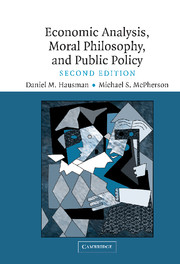Book contents
- Frontmatter
- Contents
- Preface
- INTRODUCTION
- I RATIONALITY AND MORALITY
- II WELFARE AND CONSEQUENCES
- III LIBERTY, RIGHTS, EQUALITY, AND JUSTICE
- 10 Liberty, Rights, and Libertarianism
- 11 Equality and Egalitarianism
- 12 Justice and Contractualism
- IV MORAL MATHEMATICS
- CONCLUSIONS
- Appendix: How Could Ethics Matter to Economics?
- Glossary
- References
- Index
10 - Liberty, Rights, and Libertarianism
Published online by Cambridge University Press: 06 July 2010
- Frontmatter
- Contents
- Preface
- INTRODUCTION
- I RATIONALITY AND MORALITY
- II WELFARE AND CONSEQUENCES
- III LIBERTY, RIGHTS, EQUALITY, AND JUSTICE
- 10 Liberty, Rights, and Libertarianism
- 11 Equality and Egalitarianism
- 12 Justice and Contractualism
- IV MORAL MATHEMATICS
- CONCLUSIONS
- Appendix: How Could Ethics Matter to Economics?
- Glossary
- References
- Index
Summary
Many people have a passionate commitment to individual liberty. They may object to paternalistic laws (such as those laws requiring the use of seat belts) as infringements on freedom, regardless of whether these laws increase welfare. Many would favor protecting the freedom of those with unusual lifestyles or unpopular religious convictions even if it means diminishing welfare. Social deliberation, unlike welfare economics, often treats protecting freedom and enhancing welfare as independent goals.
It is ironic that normative economics focuses on welfare, because economists value individual freedom very highly. Indeed we would conjecture that economists value freedom more than do most noneconomists. When economists have criticized socialism, for example, they have not only questioned whether it can “deliver the goods,” they have also argued that economic and political power must be kept separate in order to protect individual liberty (Friedman 1962, ch. 1). Economists also value the prosaic liberties that are part of market life, such as the freedom to change jobs, to start a business, or to move from place to place. Thus, for example, many economists favor effluent taxes or exchangeable emission rights over direct state regulation of pollution. They do so not only because the taxes or exchangeable emission rights are purportedly Pareto superior to regulation but also because state regulation limits freedom directly and, by increasing the reach of government, threatens freedom indirectly. Similarly, economists often favor cash over in-kind transfers because cash transfers leave the recipients freer.
- Type
- Chapter
- Information
- Economic Analysis, Moral Philosophy and Public Policy , pp. 159 - 173Publisher: Cambridge University PressPrint publication year: 2006



